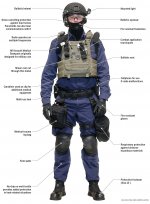Saw this in another thread,
Not to digress in the thread too much.
PCP is a baseline for Paramedics, and currently it can be obtained with less than a year of career college, and a couple of months preceptorship. There also isn't a governing body for PCPs in ON. So if you somehow manage to get in, and you're lousy, it takes a lot to get you out. ACP...different story.
Our "farm teams" were Humber and Centenial colleges. Both were / are two- year, four-semester diploma programs.
Centennial College's Paramedic program takes pride in its exceptional standards, high-quality graduates and high employment rates. You'll s

www.centennialcollege.ca
University of Toronto offers a four-year degree program.

utsc.calendar.utoronto.ca
IMHO, Paramedics get a crummy shake in ON ( I can only speak for my own province / experience).
I can only speak for my own province / department also.
Under the ASCBA, an ambulance service has to identify the number of paramedics who are "essential", but it does not prevent strike / lock out, only ensures that a specific number of personnel available for calls. ( How that differs from a normal compliment of staff seems odd).
You may know better than I do - no sarcasm intended.
I just know I was never on strike, and used this as a legal reference,
As most services have PCPs start on a call-in / casual basis, often for up to 10 years. During that time, they have no benefits, and no sick days. Full time? Yes, absolutely, but the journey to get there often chews up decent folks, and spits them out.
I was full-time from Day One. There were no part-timers.
Permanent 40-hour / week schedule, station and partner from Day One.
Full benefits from Day One.
Was never "on call".
18 sick days a year. From Day one. It is not "use them or lose them" . You bank and accumalate them year after year. When you retire they are paid to you as a "gratuity".
I received a nine month sick bank
gratuity when I retired.
Was a "probie" for 12 months. Some were on probation for 18 months. But, that does not affect any of the above. It just means they can let you go during that 12 / 18 month period.
The union would send a rep to hold your hand, but that was about it.
There was a Resiendency Requirement when I joined. But, that ended years ago.
Brihard said,
Particularly when the impacts of operational trauma are added to the picture, I don’t think it’s fair to undersell the risks paramedics face. I wouldn’t want their job.
They have a lot of support now. PTSD cases get transfered to a "suitable job".
Most importantly,
Employees who are placed in a permanent alternate position, due to an occupational injury/illness (as defined by the Workplace Safety & Insurance Board), will be subject to the normal assessment period and will receive the wage rate of the position to which they are assigned. If the pre-injury rate of pay is higher than the relocated position rate, then the pre-injury rate is to be maintained. It is understood that the pre-injury rate is subject to all wage increases negotiated.
My neighbour is a city firefighter for a department that uses 24-hour shifts, so, what, 7 days a month?
Something like that. 24-hour tours work out to 42 hours per week.
Not sure if they get lieu time or over - time to compensate, or if that's just the way it is?

We worked 20 twelve-hour shifts every six weeks.
Mine was 0700-1900
Mon, Tues, Weds, Thurs, Fri.
Mon, Tues, Wed,
Thurs, Fri
Repeat.







